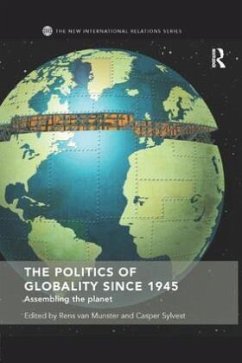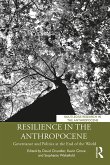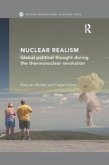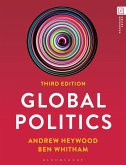This timely, comprehensive and interdisciplinary volume advances an original argument about the complex roots and multiple politics of globality. It shows that technological innovations and decisive developments since 1945 - from the nuclear revolution to anthropogenic climate change and debates about the Anthropocene - have prompted reflections on the global condition of humanity and helped reshape political communities by making the world (appear) small, manageable and interconnected.
The contributors stress how human beings have transformed both their habitat and their view of human-earth relations since 1945. Such changes have been accompanied by important shifts in political visions, prompted new forms of human association, encouraged legal and institutional reform and spurred ideas about ecological humility. At the same time, the spatially all-encompassing nature of globality have also informed projects of human mastery and a range of practices historically associated with militarization and a strongly statist conception of national security. This volume reflects on these paradoxical relationships, their history and contemporary relevance.
Contributing to the overlapping concerns of four burgeoning fields of study across the humanities and the social sciences - globality and globalization studies; geopolitics and political geography; Anthropocene studies; global governance and political theory - the book will be of great use to scholars and graduates working in these areas.
The contributors stress how human beings have transformed both their habitat and their view of human-earth relations since 1945. Such changes have been accompanied by important shifts in political visions, prompted new forms of human association, encouraged legal and institutional reform and spurred ideas about ecological humility. At the same time, the spatially all-encompassing nature of globality have also informed projects of human mastery and a range of practices historically associated with militarization and a strongly statist conception of national security. This volume reflects on these paradoxical relationships, their history and contemporary relevance.
Contributing to the overlapping concerns of four burgeoning fields of study across the humanities and the social sciences - globality and globalization studies; geopolitics and political geography; Anthropocene studies; global governance and political theory - the book will be of great use to scholars and graduates working in these areas.
'Few volumes confront the big questions of how we interpret our place in a rapidly changing world as well as this elegant collection of essays. A major contribution to the emerging field of Anthropocene studies, this volume should be read by anyone interested in how we have come to understand our current predicament and what this means for the future of humanity.' - Simon Dalby, CIGI Chair in the Political Economy of Climate Change, Balsillie School of International Affairs, Wilfrid Laurier University
'In this fascinating new book, scholars from different disciplines provide fresh insights into the concept of globality and its appropriation within an array of political and ideological contexts since 1945. By exposing the inherent ambiguities and contradictory meanings of globality, the authors offer a critical analysis of its contemporary usage from a wide variety of perspectives. It should be read by anyone interested in the contested foundations of globalization and world politics.' - Jens Bartelson, Professor of Political Science, Department of Political Science, Lund University, Sweden
'In this fascinating new book, scholars from different disciplines provide fresh insights into the concept of globality and its appropriation within an array of political and ideological contexts since 1945. By exposing the inherent ambiguities and contradictory meanings of globality, the authors offer a critical analysis of its contemporary usage from a wide variety of perspectives. It should be read by anyone interested in the contested foundations of globalization and world politics.' - Jens Bartelson, Professor of Political Science, Department of Political Science, Lund University, Sweden








